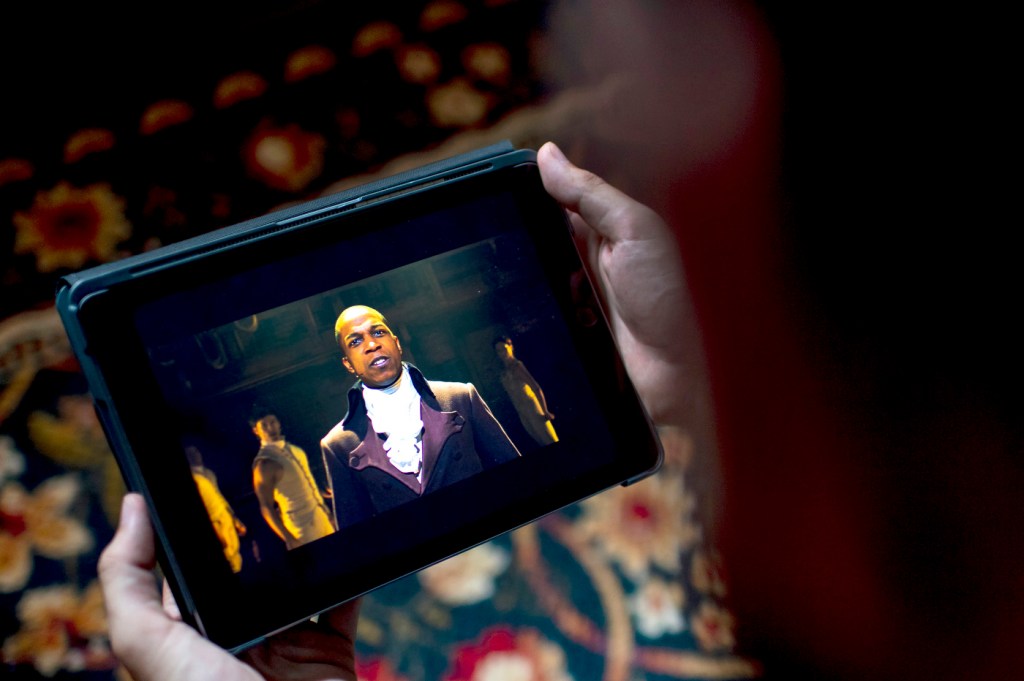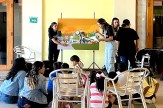‘Hamilton’ has gone virtual on Disney+. What does that mean for the future of live theater?

This month, the global musical sensation “Hamilton” hit the small screen(s) when it became available to stream from Disney+. It meant that suddenly, if you have “a laptop or phone and internet access, you have access to the world’s hottest show,” says José Delgado, a lecturer in the Department of Theatre at Northeastern.
Delgado, who is an award-winning music director, accompanist, and vocalist who has worked with performers including Jason Robert Brown, Alan Silvestri, Seiji Ozawa, and The Boston Pops and Symphony Orchestras, joined News@Northeastern to discuss the show that everyone’s talking about, and what it means for the future of live theater now that “Hamilton” has gone digital.
“This is a harbinger of things to come,” he says.
What’s been the impact of the stage performance of “Hamilton”?
“Hamilton” wasn’t just a big show that emerged on the scene, it was an event; it transcended borders, cultures, genders, levels of political engagement—everything. It broke down barriers, and even more so, it opened doors. It opened conversations of the content, of how they pulled off what they pulled off, of how [“Hamilton” playwright and star] Lin-Manuel Miranda used that language from 100 years ago.

José Delgado, an award-winning music director, accompanist, and vocalist, is a lecturer in the Department of Theatre at Northeastern. Photo courtesy of José Delgado
As the show continued to evolve, its level of impact and the scope of its impact expanded. I started noticing that each time [performers] did another live performance on late night TV, the creative team made a decision not to have the exact same people perform or even perform the exact same numbers.
Even [news] articles about the show had different talking points, they [“Hamilton” creators] seemed to very deliberately and strategically and brilliantly disseminate as much information as possible about the show. Everything about it was brilliant.
I also very much appreciated the evolution of their targeted focus on education—connecting with communities that were more disadvantaged than others, seeking out ways to engage with those communities.
It wasn’t just another great show—and I’m quoting “Hamilton” here—it was a movement, not a moment. So often, a show emerges and it’s fantastic, and depending on how audiences come to it, it’ll make a big splash, it’ll become part of the zeitgeist, everyone’s heard of it… but then there are those wonderful rare shows that transcend the parameters of their venue and seep out into the world in a broader level.
What were you looking for when you saw the musical in person?
Honestly, I was anticipating a couple of cons when I went to see it because I just knew the show so stinkin’ well, so I put myself and my sons on a “Hamilton”-free diet for the few weeks leading up so we arrived with as fresh ears as possible.
But live theater—and I’m a live theater musician, a live musician period—there are very few things that compare to it. So, if I have time to see a show, my antennae are very much up and looking and noticing everything going on.
Because I knew the show so well beforehand, there were a few moments that I was really looking forward to, and then I was just struck by how they manifested it live. There were transitional moments or moments that aren’t on the soundtrack—multiple moments where just seeing actual humans tell the story at such a high level in person was profoundly moving.
My back may have been on the back of the seat, but I’m not sure I blinked; I didn’t want to miss a single moment. And that includes the live orchestra—the orchestra made a ton of decisions that were different from the soundtrack to accompany what’s going on onstage, and I really appreciated how they did that.
How did your viewing of the streaming version feel enhanced?
There were dozens and dozens of moments: the angles at which they shot some of the scenes, the proximity from which you could see every emotion on the actor’s face.
There is an argument that being so close means sometimes you’re missing stuff happening upstage, but the tradeoff is getting that access of being right up front, and I really appreciated that element of it. And maybe my bias is coming through a bit too strongly, but those small things that are missing pale in comparison to the magnitude of the viewing experience.
And the biggest thing is that it can be everywhere. If you have a laptop or phone and internet access, you have access to the world’s hottest show, and you can watch it as many times as you want; I’m on my fourth or fifth viewing of many more.
What do you think the streaming of “Hamilton” means for the future of live performances?
We saw the beginning of a new level of engagement with theater when we saw the TV productions of shows. You’re getting that behind-the-scenes access, and we all want that. So, the soil was already fertile for people to be receptive to consuming theater in this “live” or streamed version.
With regards to what its ultimate impact will be, I have no idea—and no one really does—because this is just a drop in the bucket. What I anticipate is that there will be a handful of shows that are the biggest hits, that have the most potential to draw audiences, and the companies that take them on to stream will approach them as a business decision. But once those companies see quantifiable success of taking a chance and investing, I would suspect that it will be like a waterfall—everything will go to streaming.
This is a harbinger of things to come, and I’m excited about that because there are any number of shows that are already in existence or are coming out that I would love to see as well.
I think it will be immensely exciting for people who, for whatever reason, can’t get to the theater, and hopefully it will inspire people to seek out live theater anywhere and everywhere they can; community theater needs patronage, regional theater needs patronage, Broadway needs patronage, off-Broadway needs patronage, off- off- off- off- off-Broadway needs it. So go find it, seek it out, support it in any way you can.
For media inquiries, please contact media@northeastern.edu.





